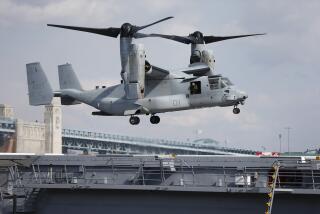Is the nation prepared to pay for the 1996 anti-terrorism bill?
- Share via
Riding a wave of national concern fueled by one of the nation’s worst airline disasters, President Clinton and the Congress agreed in December on an anti-terrorism bill. Part of the law requires the upgrading of bomb detection luggage scanners, additional FBI agents devoted solely to fighting terrorism, and better protection of critical U.S. facilities.
How much progress has been made, and will there be enough money in the new federal budget to pay for all that was called for? Would it be safe to make some compromises to reduce the final bill?
That last question takes on new importance given that the federal aviation trust fund, which is used for air safety improvement, totals $1.2 billion less than was thought in December. Treasury Secretary Robert Rubin has urged the Congress to quickly renew a 10% airline ticket tax to bolster the fund.
These issues ought to be addressed in a report, due soon, from the White House Commission on Aviation Safety and Security, headed by Vice President Al Gore. The commission was formed after TWA Flight 800 exploded last July 17, killing all 230 aboard. The bombing at Centennial Olympic Park in Atlanta that killed one person and injured more than 100 just 10 days later added to the national sense of urgency.
The two incidents rightly prompted moves toward the kind of heightened security found at many European airports. But a couple of fiscally conservative think tanks have questioned the need for extensive, permanent new security measures; the doubts they raise are based on the possibility that mechanical problems, not a terrorist act, caused the fuel tank explosion that brought down Flight 800.
The task of defending the new security goals falls on Gore’s commission. Clearly the threat of airliner terrorism is strong enough worldwide to justify the recommended security changes.
The National Transportation Safety Board has recommended urgent design changes for Boeing 747 jets (Flight 800 was a 747) and other airliners. It acted after experiments found that static electricity or a fuel tank overheated by adjacent machinery might trigger an explosion. The FAA always has 90 days in which to draft a response to an NTSB recommendation. Here’s one situation in which the FAA ought to try to come in well under that limit.
Recommended changes to fuel tanks would, by most accounts, be relatively inexpensive. The airlines ought to consider voluntary action such as they recently took in deciding to place smoke detectors in cargo holds. In that case they acted, without federal orders, as evidence mounted that a smoke detector might have alerted the crew to a cargo fire in another horrifying 1996 crash, that of a ValuJet airliner in the Florida Everglades.
More to Read
Sign up for Essential California
The most important California stories and recommendations in your inbox every morning.
You may occasionally receive promotional content from the Los Angeles Times.













